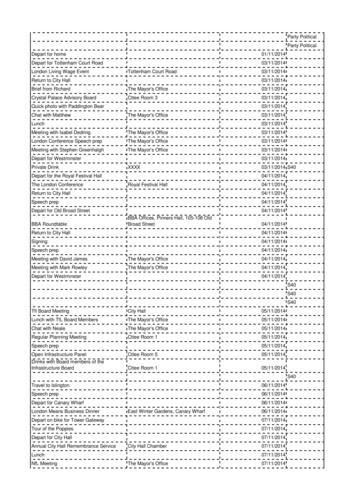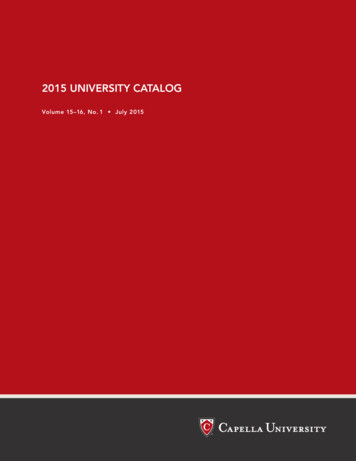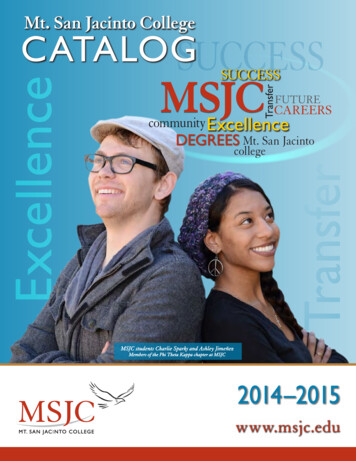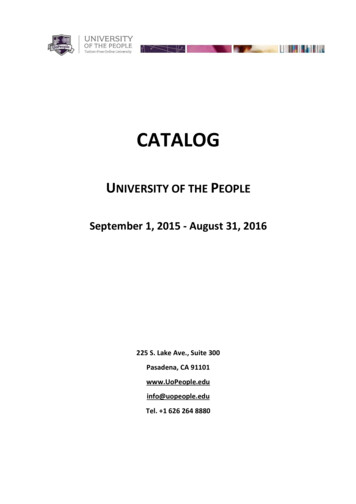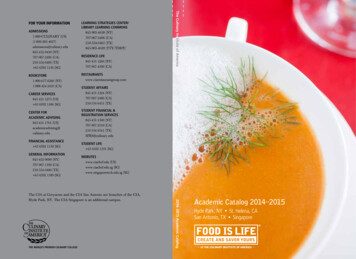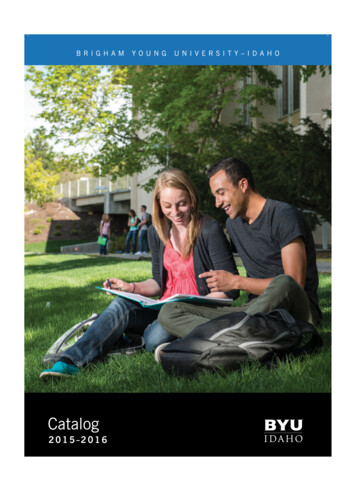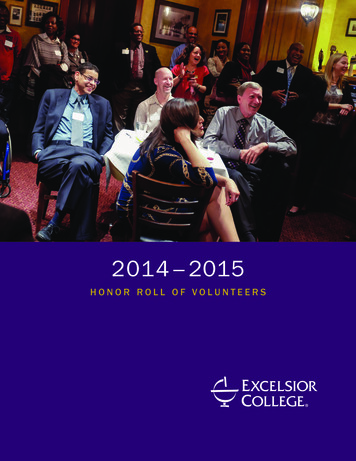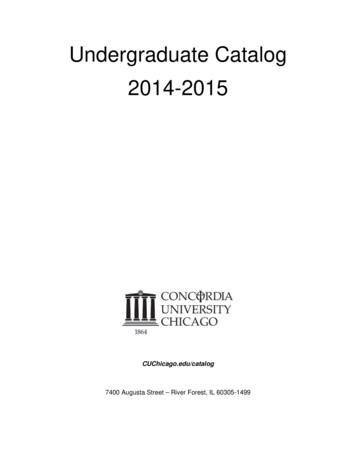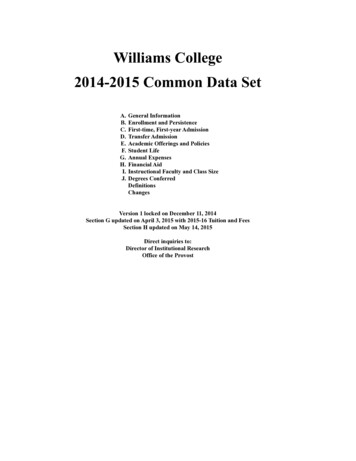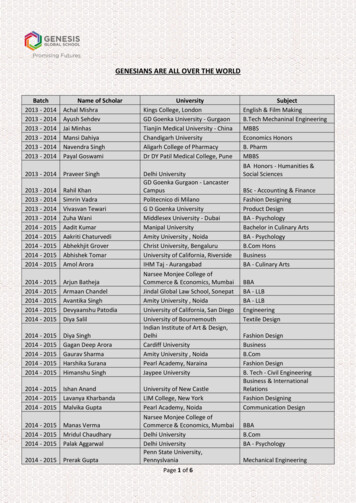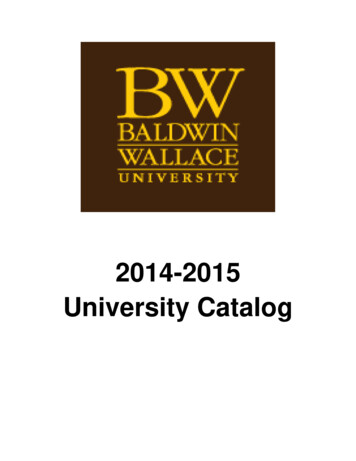
Transcription
2014-2015University Catalog
TABLE OF CONTENTSAbout Baldwin Wallace University3-4Majors, Minors and other Undergraduate Academic Programs5-6Undergraduate Academic Policies and Procedures7-14Undergraduate Academic Opportunities15-18Academic Support Services19-22Student Status Policies23-26Admissions Information27-30Registration Policies31-34Undergraduate Program Requirements35-230Graduate Program Requirements231-255Course Descriptions Undergraduate and Graduate256-440Disclaimer:Programs and courses are under constant review. This catalog is a source of general information and does notconstitute an irrevocable contract between Baldwin Wallace University and any individual person. The Universityreserves the right to make necessary changes to the provisions and policies of this catalog at any time. All suchchanges are effective at such time as determined by the University and may apply to all prospective and matriculatedstudents.
About Baldwin Wallace UniversityFounded in 1845, Baldwin Wallace was among the first colleges to admit students without regard to race or gender.That spirit of inclusiveness and innovation continues today. The academic program, rooted in the liberal arts, yetbalanced by abundant opportunities for career exploration and application, is designed to prepare students to make aliving.and a life worth living. Affiliated with the United Methodist Church, Baldwin Wallace University is anindependent, coeducational University located in Berea, Ohio, a suburb southwest of Cleveland. Today, theUniversity serves approximately 3100 full-time undergraduates, 800 part-time students in evening and weekendprograms and over 700 graduate students in education and business administration.The University maintains more than 50 academic programs within the following eight schools: businessadministration, education, health and physical education, humanities, Conservatory of Music, science andmathematics, and social sciences.Non-Discriminatory PolicyBaldwin Wallace University does not discriminate because of race, creed, age, disabilities, national origin, gender orsexual orientation in the administration of its policies or programs.Statement of Mission of Baldwin Wallace UniversityBaldwin Wallace University is an academic community committed to the liberal arts and sciences as the foundationfor lifelong learning.The University fulfills this mission through a rigorous academic program that is characterized by excellence inteaching and learning within a challenging, supportive environment that enhances students' intellectual and spiritualgrowth.Baldwin Wallace assists students in their preparation to become contributing, compassionate citizens of anincreasingly global society and encourages their pursuit of personal and professional excellence.Statement of Church RelatednessBaldwin Wallace University values its historic relationship and active affiliation with the United Methodist Church. TheUniversity provides a supportive environment enhancing all students' intellectual, moral, and spiritual growth. TheUniversity respects the diversity of individual religious beliefs, including those who profess no religious viewpoint. Allmembers of the University community are encouraged to participate in activities related to spiritual growth anddevelopment. The University is deeply committed to the open pursuit of knowledge and stresses such values asintegrity, honesty, justice, compassion, and spiritual growth as integral to that pursuit. Further, the Universityrecognizes the vital connection between faith, knowledge, and service and offers a variety of means to develop andstrengthen those connections for members of the University community. As a United Methodist related school,Baldwin Wallace University prepares students for lives of informed and mature leadership as global citizens in adiverse world.Division III Athletic Philosophy StatementBaldwin Wallace University seeks to establish and maintain an environment in which a student's athletics activitiesare conducted as an integral part of the total educational experience. The University places highest priority on thesuccessful completion of the academic program for all students.In addition the University seeks to establish and maintain an environment that values cultural diversity and genderequity among their student-athletes and athletics staff.To achieve this end, Baldwin Wallace University3
a.b.c.d.e.places special importance on the impact of athletics on the participants rather than on the spectators andgreater emphasis on the internal constituency (students, alumni, institutional personnel) than on the generalpublic and its entertainment needs;awards no athletically related financial aid to any student;assures that athletics participants are treated no differently than any other member of the student body;assures that athletics programs support the institution's educational mission by financing, staffing, andcontrolling the programs through the same general procedures as other departments of the institution;provides equitable athletics opportunities for males and females and gives equal emphasis to men andwomen's sports.AccreditationBaldwin Wallace University is accredited by The Higher Learning Commission, a commission of the North CentralAssociation of Colleges and Schools. The address, telephone number and website for this accrediting body is 230South LaSalle Street, Suite 7-500, Chicago, Illinois 60604-1413; on.org.In addition, the University is on the approved lists of the American Chemical Society, University Senate of the UnitedMethodist Church, Ohio College Association and the American Association of University Women. It was approved bythe Association of American Universities in 1931, and its credits are accepted wherever American college work isrecognized. Baldwin Wallace is a member of the Association of American Colleges and Universities, the AmericanCouncil on Education, the American Association of Collegiate Schools of Business, and the American Association ofColleges of Teacher Education.The undergraduate programs in music also are accredited by the National Association of Schools of Music and inelementary, secondary and all-grades education by the National Council for Accreditation of Teacher Education(NCATE)/Council for the Accreditation of Educator Preparation (CAEP). The University is approved for teachereducation in the following areas: Early Childhood Education (pre-kindergarten-grade 3); Middle Childhood Education(grades 4-9); Adolescent Young Adult (grades 7-12) in Integrated Language Arts, Integrated Mathematics, IntegratedScience, Integrated Social Studies, Life Sciences, and Physical Sciences; Multi-Age Education (prekindergartengrade 12) in Foreign Languages (French, German, or Spanish), Health, Music, Physical Education, or Visual Arts,Intervention Specialist; Mild/Moderate Educational Needs (kindergarten-grade 12); and endorsements in Reading andComputer Technology. Because of the fluctuating requirements for licensure to teach in the various states, it isrecommended that candidates for licensure check with departments of education in the states in which they intend toteach. This will give them the opportunity to schedule required courses wherever possible.The Accelerated Bachelor of Science in Nursing (ABSN) Program has Ohio Board of Nursing Conditional Approvalsubject to a Consent Agreement, a copy of which is available upon request from the Director of the Nursing Program.The ABSN Program is in candidacy for accreditation by the Commission on Collegiate Nursing Education (CCNE).The Accreditation Review Commission on Education for the Physician Assistant (ARC-PA) has granted AccreditationProvisional to the Baldwin Wallace University Physician Assistant Program.The Athletic Training Education Program is accredited by the Commission on Accreditation of Athletic TrainingEducation (CAATE).Approved plans of study are provided to prepare students for graduate study or for professional schools of medicine,dentistry, law, engineering, theology, art, library science, social service work, medical technology, physical therapyand forestry4
Majors, Minors and Other UndergraduateAcademic Programs 2014-15MAJORSForeign Languages & Literatures:FrenchGermanSpanishHealth & Physical Education:Athletic TrainingExercise ScienceHealth Coaching & Health PromotionHealth & Physical Education Teacher EducationPre-Physical TherapySport ManagementHistory*#Industrial & Organizational PsychologyInternational Studies:International AffairsNational SecurityMathematicsMusic:CompositionMusic History & LiteratureMusic TheatreMusic TheoryMusic TherapyPerformanceMusic Education (BME)Music in Liberal Arts hysics:PhysicsPhysics-Based Engineering AreasChemistry-Based Engineering AreasPolitical SciencePsychology*Public HealthPublic HistoryPublic Service LeadershipReligionSociology*Software EngineeringSustainability:Business AdministrationHumanities & Social ScienceQuantitativeSciencesTheatre:Acting & DirectingDesign & TechnicalStage ManagementArt:History of ArtStudio ArtBiologyBusiness:Accounting*Business Administration*Finance*Health Care Management*Human Resource Management*#Innovation & EntrepreneurshipInternational BusinessManagement*Marketing*Organizational Leadership (only A&CE)*ChemistryCommunication:Applied Communication Studies (only A&CE)*Broadcasting & Mass CommunicationCommunication StudiesFilm StudiesPublic RelationsCommunication DisordersComputer Information Systems:Information Systems AnalystNetwork & Security AnalystComputer ScienceCriminal JusticeDigital Media & Design:Graphic DesignInteractive DesignEconomics:EconomicsMathematical EconomicsEducation:*Early Childhood (PreK-3)Middle Childhood (4-9) (students mustselect two out of the following fourcontent areas: mathematics; science;reading/language arts; social studies.)Adolescent/Young Adult (7-12)(students must select one of thefollowing teaching fields):Integrated Language ArtsIntegrated MathematicsIntegrated ScienceIntegrated Social StudiesLife SciencesPhysical SciencesMulti-Age (preK-12) (students must selectone of the following teaching fields):Foreign Language – French, German or SpanishHealthMusicPhysical EducationVisual ArtsMild/Moderate Educational Needs (K-12)English:*EnglishEnglish- Creative Writing5
Political Science*Psychology*Public Service tyTheatreUrban StudiesMINORSArtHistory of ArtStudio ArtAsian StudiesBiologyBusiness:Accounting*Business Administration*EntrepreneurshipFinance*Health Care ManagementHuman Resource Management*International BusinessManagement *Marketing*Organizational Leadership*ChemistryCommunication:Broadcasting & Mass CommunicationCommunication Studies*Film StudiesPublic Relations*Communication DisordersComputer Information Systems*Computer ScienceCriminal JusticeDanceDiversity StudiesEconomicsEducation (for students seeking licensure inAdolescent/Young Adult or MultiAge Education)**English:Creative WritingLiteratureWritingForeign Languages & Literatures:FrenchGermanSpanishForensic ScienceGender StudiesGeologyHealth & Physical Education:Athletic CoachingFamily StudiesHealth Promotion & EducationNutritionOrthopedic Assessment & TreatmentRecreationHistory*International Studies:International AffairsNational SecurityLeadership Studies*Legal StudiesMathematicsMiddle Eastern & North African PhysicsDUAL-DEGREE PROGRAMSAccounting and MBAComputer Information Systems and MBAComputer Science and MBAHuman Resource and MBAEngineering (Chemistry- or Physicsbased), affiliation with:Case Western Reserve UniversityColumbia UniversitySocial Work (Psychology- orSociology-based), affiliation with:Case Western Reserve UniversityA2B PROGRAMSExercise ScienceHealth Care ManagementManagementOrganizational LeadershipOTHER PROGRAMS OFCONCENTRATIONArts ManagementMedical TechnologyEarly Childhood Education Generalist EndorsementMiddle Childhood Education Generalist EndorsementPre-PharmacyCERTIFICATE PROGRAMSAccountingHuman Resource ManagementOrganizational LeadershipPublic HistorySustainability*Also available in Adult and Continuing Education.Some programs may require some day classes.**Does not apply to Music Education licensure.#6Not offered as a primary major.
Undergraduate Academic Policies and ProceduresIntroductionThe general requirements for a bachelor's degree are intended to achieve four major goals: an individualized academic program reflecting each student's special needs, interests, and aspirations;sufficient work in a variety of academic areas to introduce breadth into the academic program;an exploration in depth of at least one area of knowledge;a sufficient number of elective hours to enable the student to pursue secondary interests that support andsupplement other requirements.The University attempts to provide an atmosphere in which the student can develop the abilities to think creativelyand critically, to make honest and objective judgments, to perceive and utilize patterns of balance between personalneeds and the needs of others; and, finally, to work independently in exploring areas of knowledge and growthbeyond those studied formally in the classroom. In line with these principles, the academic program undertaken byeach student is comprised of the general requirements described in this section, a major in an academic area, aminor in an academic area, an approved experiential learning experience and elective courses the student carefullychooses to pursue special interests.The student, working with a faculty advisor, is responsible for planning his/her own course of study. Whileacademic advising is a process of communication and information exchange between student and advisor,the ultimate responsibility for program, course selection, and meeting graduation requirements rests withthe student.DegreesExcept those subsequently noted, Baldwin Wallace University grants the degree of Bachelor of Arts (B.A.) tostudents who complete the requirements for graduation. The degree of Bachelor of Science (B.S.) is granted tothose who have majored in one of the following majors, psychology, mathematics, computer science, or computerinformation systems. The degree of Bachelor of Science in Education (B.S. in Ed.) is granted to students whomajor in early childhood education, middle childhood, and mild/moderate educational needs. The degrees ofBachelor of Music (B.M.) and Bachelor of Music Education (B.M.E.) are granted to those students who completethe respective programs in the Conservatory. The Bachelor of Science in Nursing (B.S.N.) is awarded to ournursing graduates.A student who desires two bachelor's degrees must meet the following requirements: (1) The candidate must meetthe particular subject requirements for both degrees and the core requirements. (2) An additional 32 credit hoursmust be completed at Baldwin Wallace beyond the requirements of the first degree. (3) There can be no duplicationof departmental major fields. As an example, a student earning a Bachelor of Music degree and a Bachelor of Artsdegree cannot elect a major in music for the BA degree. (4) Comprehensive examinations or their equivalent, asrequired by major departments, must be completed.For information on graduate degrees offered by Baldwin Wallace University, see Graduate ProgramRequirements.The University CoreAll undergraduate students at BW pursue a course of study sufficiently varied to acquaint them with a broad spectrumof human knowledge and to provide them a strong foundation in core academic skills. The knowledge and skills thatstudents utilize and develop through their core courses are essential to their success in academic work as well as intheir personal and professional lives.The core requirements include course work in the following areas: foundation courses in Mathematics, EnglishComposition, and Liberal Arts and Sciences (LAS 200); breadth courses in the Humanities, Social Sciences and7
Natural Sciences; wellness courses in Health and Physical Education; coursework in International Studies; andcoursework in Diversity Studies. Completion of a minor adds depth in a particular area of study, to balance thebreadth provided by distribution requirements across the major disciplinary areas in the Liberal Arts and Sciences.Specific area, course and credit requirements for fulfillment of the University core are described inUndergraduate Program Requirements.Academic Majors and MinorsThe Academic Major: Students must complete a major in an academic area, and are encouraged to declare theirmajor by the end of the sophomore year. Students who meet the minimum requirements of the University may majorin any course of study offered by the University. There are no other requirements for admission to or continuation inany major except for the Bachelor of Music and Bachelor of Music Education programs, the certification programs ofthe School of Education, and the Sports Medicine/Exercise Science Major, Athletic Training Concentration EducationProgram.If the major is in a single academic department, it will include a minimum of 23 semester credits of courses in thedepartment plus additional requirements as stipulated. These may include specific courses, a specified number ofcredits in excess of 23 semester credit hours, courses in other departments, proficiency examinations, and otherappropriate activities such as recitals, exhibitions and student teaching.Students may complete more than one major providing they meet all of the requirements. A department cannotrequire a minimum grade point average for a major nor require a student to take more than 53 credits from a singleacademic department.Transfer students are required to complete at least 40% in their major field of study at BW. Exceptions may be madeby an individual department based on an examination or other appropriate evaluative methods. Some departmentsrequire more than 40%.A self-directed interdepartmental major may be arranged in consultation with the heads of the departmentsconcerned. Interdepartmental majors must include coursework from three departments and a minimum of 36 credithours, of which 15 must be at the 300-400 level. Written copies of the agreement specifying the requirements forthe interdepartmental major must be signed by the heads of these departments and filed with both the UniversityRegistrar and the student's faculty advisor. This request must be made prior to the student's earning 91 semestercredits towards a degree at Baldwin Wallace University.Only four credits of "D" (D , D, and/or D-) in a major may be counted toward the total number of credits requiredin a student's major department. If a student exceeds the four-credit rule, the major department will decide if thestudent should take an additional course(s) beyond the minimum credits required for the major or repeat thecourse(s) graded "D." If a student is required to repeat a course, the total number of credits required for graduationwill be increased.The Academic Minor: All students* must complete an academic minor. (A second major will also satisfy thisrequirement.) An academic minor consists of at least 17 semester credits as specified by the department offering theminor. A minimum of six of the 17 credits must be earned at Baldwin Wallace. A student may fulfill the minorrequirement in any department or school, as long as the minor selected is not identical to the student's major or is nototherwise prohibited by the department in which the major resides. Consult the section of the catalog that describesthe requirements for each major to identify those minors that are not permitted.*Does not apply to Music majors (other than Music in Liberal Arts) or students pursuing licensure in Early ChildhoodEducation.A self-directed interdepartmental minor may be arranged in consultation with the heads of the departmentsconcerned. Interdepartmental minors must include coursework from two departments and a minimum of 17 credithours, of which 9 must be at the 300-400 level. Written copies of the agreement specifying the requirements for the8
interdepartmental minor must be signed by the heads of these departments and filed with both the UniversityRegistrar and the student's faculty advisor. This request must be made prior to the student's earning 91 semestercredits towards a degree at Baldwin Wallace University.Specific major and minor requirements, course descriptions and other programs of study are described indetail in the Undergraduate Program Requirements section of this catalog.The Experiential Learning Graduation RequirementExperiential learning is a process through which students develop knowledge, skills, and values from directexperiences. Experiential learning encompasses a variety of activities which already exist as structured experienceswithin the BW curriculum, including internships, service learning, undergraduate research, study abroad, and othercreative coursework and professional experiences within majors and minors.Learning that is considered "experiential" includes all the following elements:1. Reflection, critical analysis and synthesis2. Opportunities for students to take initiative, make decisions, and be accountable for the results3. Opportunities for students to engage intellectually, creatively, emotionally, socially, or physically4. A designed learning experience the includes the possibility to learn from natural consequences, mistakes, andsuccessesThe Experiential learning requirement may be met by either completing a pre-approved course or by completing anindividually designed experience. Students who choose to complete an individually designed experience will workwith a faculty or staff mentor who will approve the experience; help to connect classroom knowledge and out-ofclassroom experience; and guide them as they reflect on the experience. Every BW student must complete theExperiential Learning Requirement prior to graduation.Grading SystemAt the completion of a semester's work, students are graded in each subject. Grades given are:Grade QualityPoints:A 4.000SSatisfactory hours earned toward degree, equivalent to A, B or C, no quality pointsA4.000UUnsatisfactory. No hours earned toward degree, equivalent to C-or belowA-3.667IIncompleteB 3.333WWithdrawal prior to completion of 60% of the courseB3.000WP Withdrawal passing after completion of 60% of course with registrar's approvalB-2.667WX Withdrawal failing after completion of 60% of course with registrar's approvalC 2.333AUAudit. No creditC2.000NRNon-reported grade by instructorC-1.667CIP Courses in progress9
D 1.333TTemporary grade for continuing course, work must be validated by subsequent letterD1.000D-0.667F#Failure for stop attending a classF0.000*Freshman Forgiveness. First attempt not in GPA Returning Student Forgiveness. First attempt not in GPA.grade to count for creditQuality points are used in calculating the student's grade point average (GPA). To find the GPA, multiply the numberof credit hours in a course by the quality point value of the letter grade (A, four, B, three, etc.); then add the qualitypoints earned for each course and divide by the total number of graded credit hours attempted. Courses graded S, U,I, T, AU. NR, W, WX, and WA are not used in computing GPA.A GPA Calculator can be found at plete GradesThe mark "I" is given only when, through no fault of his/her own, a student is unable to complete the work. It is theresponsibility of the student to inform the instructor why he/she is unable to complete the work, and the instructorshall determine whether the mark "I" is justifiable. If the instructor reports the mark "I" to the registrar, justification forthis mark must be submitted in writing. Students receiving an "I" Incomplete grade have until the end of week six ofthe immediate subsequent Fall or Spring semester in which they are enrolled to complete all coursework before theyare converted to a grade of "F". All "I" grades will convert to an "F" one calendar year following the completion of thesemester in which the "I" grade was given. Extensions to the above deadlines must be submitted in writing by theinstructor of the class to the Registrar's Office.Temporary GradeThe mark "T" is given in courses which are completed over a two- or three-semester period. The "T" indicates that thecourse work is progressing satisfactorily. A completion date must be stipulated when the instructor submits the "T"grade. Failure to complete work by the established date will result in the grade of "F" being automatically awarded.Work which is given a "T" must be validated by a subsequent letter grade to count for credit.Non-Reported GradeThe mark "NR" is given when no regular grade is reported by the instructor. The "NR" must be replaced with a regulargrade. A letter grade for outstanding NR's must be reported to the Office of Registration and Records not later thanthe last day of the sixth week of the next term of registration. Unreported NR's by deadline become "F" grades.Satisfactory/Unsatisfactory GradesS/U Grading (Pass/Fail) In order to provide students the opportunity to explore a greater variety of academicdisciplines outside their major fields and at the same time reduce the stress of competition with majors in thesedisciplines, Baldwin Wallace has instituted a "satisfactory-unsatisfactory" (S/U) grading system. Performance in acourse equivalent to the traditional "A " through "C" level will be considered satisfactory (S), while a "C-" through "F"level of performance will be deemed unsatisfactory (U). Students earning an "S" grade will receive credit towardgraduation for the course. A "U" grade will appear on the student's transcript but will not provide credit towardgraduation. S/U grades do not affect the student's grade point average (GPA). The S/U option is designed to operateon two levels and may be initiated either by the faculty or by the individual student as stipulated below. Faculty Option: The S/U option may be used, with the approval of the Curriculum Advisory Board of theUniversity faculty, for those courses in which the department concerned feels that the students taking thecourse cannot be successfully graded according to the traditional "A " through "F" system. There is no limitto the number of such courses a student may take.Student Option: Sophomores, juniors and seniors not on academic probation may also elect a maximum offour credit hours per semester, up to a maximum of 20 credit hours, to be graded on an S/U basis. A student10
may take any course except those in his major or minor department, those required by his major orminor department and foundation courses LAS 200, ENG 131 and the core MTH course on an S/Ubasis. All other courses, including the general curriculum requirements, may be taken under the S/U option.If a student declares their major as undecided but, at a later date, majors in the department that was S/U,the professor will be asked to submit a grade and it will be calculated into the GPA. The decision by thestudent to take a course on this basis must be declared to the registrar by the last day of the fourth week ofthe term. The student may, within the same period, nullify the election of this option. Students being gradedunder the S/U option must fulfill all requirements of the course.Repeated Courses and GradesAny course in which a grade of "C-" through "F" is received may be repeated; credit toward the degree (hoursearned) may be received only once. However, the hours and quality points represented by each attempt will beincluded in the grade point average (GPA). See Freshman Forgiveness Policy for an alternative option available tostudents during their first 32 hours of coursework. See Returning Student Grade Forgiveness Policy for an alternativeoption for students who have not attended for a minimum of 5 years.Audit CreditGrades are not given for non-credit (audit) work. A student who desires a grade in a course must take it for credit.Courses are offered for credit or audit. A student taking a course on an audit basis will agree with the courseinstructor to participate in certain aspects of the course (often this is class attendance). If this agreement is fulfilled,the course instructor will authorize the registrar to indicate on the student's transcript that the course was taken on anaudit basis. If the agreement is not fulfilled, a grade of "W" will appear on the transcript. Changes from audit to creditmay not be made after the first week of the semester.Freshman Forgiveness PolicyA course that a student takes during the first 32 credit hours of his or her academic career can be repeated. Thegrade obtained in the first attempt is removed from the calculation of the GPA and is designated with a symbol (*)signifying that the course was repeated and that the original grade is not included in the GPA calculation. The gradeobtained on the second attempt is used to calculate the GPA, even if it is lower than the first attempt.A course can only be repeated once under this policy. The credits of the repeated course count only once towardgraduation requirements.This policy does not apply to students transferring 32 or more credit hours; it applies, however, to students who aretransferring fewer than 32 credit hours, as long as the course that is repeated was taken at Baldwin WallaceUniversity before the student earned 32 credits.A course must be repeated at Baldwin Wallace University the following semester, or the semester during which it isnext offered, for the student to be able to benefit from this policy. Any course can be repeated under this policy, aslong as the first attempt was taken at BW within the first 32 credit hours of University work of the student.Freshman Forgive
Methodist Church, Ohio College Association and the American Association of University Women. It was approved by the Association of American Universities in 1931, and its credits are accepted wherever American college work is recognized. Baldwin Wallace is a member of the Association of American Colleges and Universities, the American
